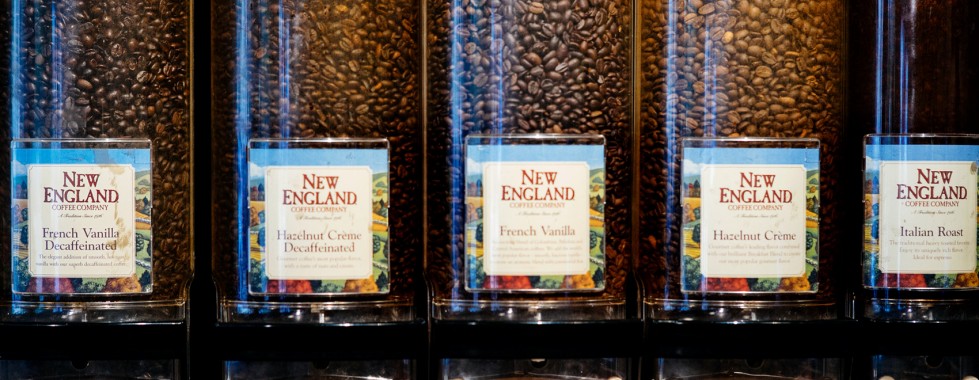
Our decaffeinated coffees are produced by a direct solvent process that removes 99% of the caffeine. Based on extensive research data, the U.S. Food and Drug Administration (FDA) has determined that this is a safe & effective method for coffee decaffeination.
Decaffeinated coffee in the United States must have at least 97% of its caffeine removed. Each five-ounce cup of decaffeinated, therefore, contains less than 5 milligrams of caffeine.
Our flavored coffees include essential oils and other plant derivatives, as well as aromatic flavorings.
The flavors are essentially non-nutritive and don’t contain fat or cholesterol. All edible items have some caloric value but the flavors in our coffees add less than one calorie per cup.
Most of our flavors are free from sugar and alcohol, although some of our flavors may contain nominal amounts. However, the amount of sugar or alcohol which ends up in the cup is too small to be readily measured and is of no dietary significance.
No, there is no lactose in any of our flavored coffees.
All our flavorings are certified Kosher.
No, our flavored coffees do not contain gluten.
Our beans come from countries such as Colombia, Costa Rica, Sumatra, Indonesia, Papua New Guinea, Kenya, Ethiopia, Guatemala, and Brazil. Our beans are exclusively 100% Arabica and are roasted and ground in our Malden, MA, facility.
Arabica beans are considered to be of much higher quality and flavor with a sweet, acidic taste. These hand-picked beans account for 75% of all world coffee production. Robusta beans (named for their hardiness) have a strong, harsh, and bitter taste. They are machine-harvested beans and are mostly used in instant coffee and commercial blends.
Yes. To order, please contact your sales representative directly or complete an online form to reach a member of our sales team by clicking here. Select whole bean coffees are also available on our website at www.newenglandcoffee.com and at our Coffee Shop located at 108 Charles St. Malden, MA.
Throughout the year, we offer a variety of seasonal and Limited Time Only flavors of whole bean and ground coffee. These are available to purchase through our website while supplies last.
You can sign up for our email in order to receive notice of these offerings. If you are a foodservice customer, please contact your sales representative directly.
Yes. All of our coffees are certified Kosher by the Rabbinical Council of New England (KVH) or Orthodox Union (OU).
No. None of our coffees contain nuts, including Hazelnut Créme.
No. None of our coffees contain wheat or wheat products and this includes gluten.
New England Teas contain a fine blend of Orange Pekoe and Pekoe Cut Black Tea.
All edible items present some caloric value but our teas offer less than one calorie per cup.
Yes. New England teas are certified kosher.
No. Our teas do not contain gluten.
Our decaffeinated teas are made with naturally decaffeinated orange pekoe and pekoe cut black tea tea.
As part of our 100-year commitment to quality we use the highest quality materials available in packaging technology. Our packages are made of polyester, foil, and polyethylene. The polyester is used as a barrier for oxygen, the foil as a barrier for oxygen and light, and the polyethylene provides a barrier for moisture and as a sealant for the bag. Without these materials New England Coffee could not maintain the standards quality that have guided our business since 1916.
Our single serve K-Cup® pods are made with #7 plastic, which means they are made from a multi-layer blend of materials and plastic. The inside layers are polyethylene, which is one of the most common plastic food packaging material used today. All specifications for our products require that they be constructed using only industry standard materials that meet or exceed Food & Drug Administration guidelines for product safety.
New England Coffee fully supports the ongoing efforts of the packaging industry to develop a more environmentally-friendly material that will protect the flavor and freshness of its products. New England Coffee also supports Keurig’s commitment to making k-cup pods 100% recyclable by 2020.
Our service department is available by phone 24 hours a day / 7 days a week: 1-781-873-1536.
You can order a wide variety of our custom bagged coffees on our website. All online orders are fulfilled by our small, dedicated coffee shop team. All our custom bagged coffees are freshly ground and bagged by hand for each order in our full service coffee shop located right in Malden, MA. Orders are mailed the same day they are bagged through USPS priority mail.
Our custom ground coffees remain fresh for one month when stored in an airtight container. When you receive your custom ground or whole bean coffee, transfer to an airtight container. Our 5-lb. whole bean bags remain fresh for 5 months when unopened.
Once opened, ground coffee should be consumed within a week, while whole bean coffee should be consumed within two weeks for optimal taste and freshness. The natural enemies of coffee are air, moisture, and heat, so always store your coffee in an airtight container in a cool, dry place.
For the best tasting cup of New England Coffee, we recommend using the following grind types with these brew methods:
